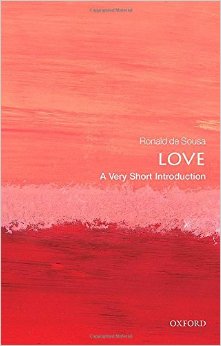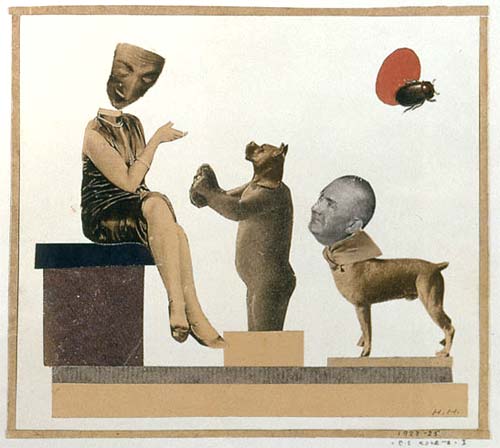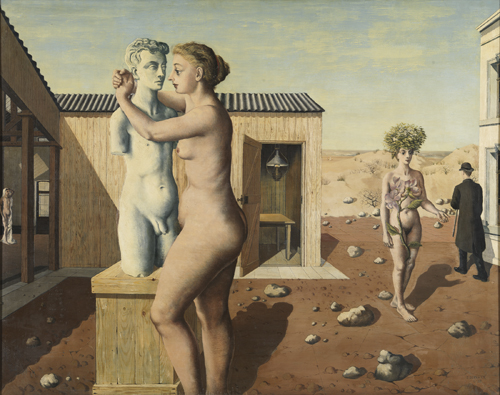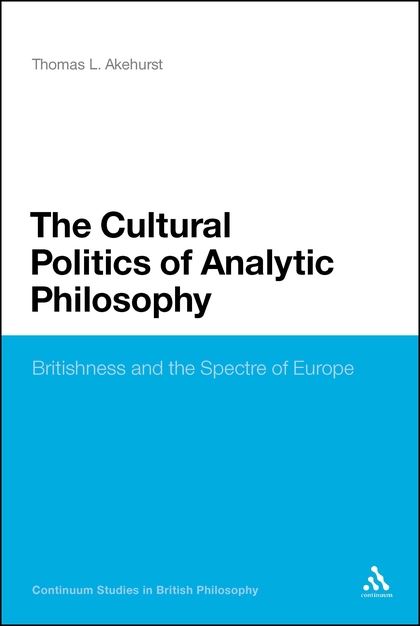Katherine Angel is a Leverhulme Research Fellow at the Centre of the History of the Emotions at Queen Mary University of London, where she works on the history of sexuality and psychiatry. She is the author of Unmastered: A Book On Desire, Most Difficult To Tell (Penguin, Farrar Straus & Giroux), and is currently writing a book on female sexual dysfunction and post-feminism.
In this post, written for both the History of Emotions and Cultural History of Philosophy blogs, Katherine reviews one of the most recent additions to Oxford University Press’s series of Very Short Introductions, this one on the subject of love, by the philosopher of emotions Ronald de Sousa.
 Why do we love a person we love? Is this the kind of thing we can know? These are recurring questions in Ronald de Sousa’s Love: A Very Short Introduction. Perhaps more accurately, the question is whether we in fact love for reasons at all. We enlist reasons for our love – he’s so playful, so accomplished – but it’s the location of qualities in someone’s particular personhood, with all its embodied wholeness, that enables love for them. What’s more, de Sousa notes, ‘an outside observer may detect causes of love that will always remain obscure to the lover’ (p. 57). These causes might include early attachment experiences, or strategies unconsciously deployed to keep particular anxieties – of abandonment, of rejection – at bay. And Freud’s psychoanalysis developed significantly from the insight that we can be wrong not just about why we love a person, but also about the fact that it is them we love: transference is precisely the direction of intense feelings (whether of love or hate) onto another target. There is always the possibility that a ghostly, unrecognised object of love is hovering behind the one we are apparently fixated on.
Why do we love a person we love? Is this the kind of thing we can know? These are recurring questions in Ronald de Sousa’s Love: A Very Short Introduction. Perhaps more accurately, the question is whether we in fact love for reasons at all. We enlist reasons for our love – he’s so playful, so accomplished – but it’s the location of qualities in someone’s particular personhood, with all its embodied wholeness, that enables love for them. What’s more, de Sousa notes, ‘an outside observer may detect causes of love that will always remain obscure to the lover’ (p. 57). These causes might include early attachment experiences, or strategies unconsciously deployed to keep particular anxieties – of abandonment, of rejection – at bay. And Freud’s psychoanalysis developed significantly from the insight that we can be wrong not just about why we love a person, but also about the fact that it is them we love: transference is precisely the direction of intense feelings (whether of love or hate) onto another target. There is always the possibility that a ghostly, unrecognised object of love is hovering behind the one we are apparently fixated on.
Much of de Sousa’s book is in a tone of accessible, chatty musing on some of the main questions about love. Why are some forms of love taboo? Is it a problem that love is subjective? Is love blind? Does love free or bind one? What is the relationship between love and sex? It also, rather self-consciously, introduces several pieces of philosophical terminology (‘explaining the significance of these two facts is going to be a little intricate, and will require me to introduce some philosophical jargon….if you bear with me, we should be able to gain some clarity’, p. 58) in a bid to make useful distinctions and gain purchase on a potentially unwieldy subject. (The terminology includes ‘intentional states’, ‘propositional object’, ‘focal property’.)
What quickly becomes clear, in particular in the insistence on the question of reasons versus causes of love, is the extent to which the book is framed by the conventions of a broadly analytic Anglo-American philosophy. The concerns of the book feel primarily determined by prior debates internal to the practice of that discipline. The question of whether we love for reasons, while an interesting one, begins to feel, as the book progresses, like a case study the author is using in order to articulate a particular position on a conventionally invoked debate about the distinction between reasons and causes. As such, the book feels less like an introduction to Love, or to thought on love, than an introduction to analytic philosophy’s commitment to an ahistorical, free-floating, unmoored conceptual analysis unencumbered by complicating details such as particularities of time and place. There’s nothing wrong with writing a book from within the conventions of one’s discipline. But here, the somewhat narrow and skewed take on the supposedly most universal concern of all turns this into a book curiously distorted by the techniques, language and methodology of a very particular and contingent way of conceiving of philosophy.
One of the problems with this way of doing philosophy is an unreflected-upon tendency to see the question of what philosophy might be as having already been resolved – and to reduce substantial questions about the discipline and its history to a vision of itself as a quasi-technical application of a method; a method which amounts more or less to a kind of sophisticated cleverness, an ability to see distinctions where others fail to, the application of intelligence and rigour. The roots of the much-discussed division between ‘analytic’ and ‘continental’ philosophy in differing responses to positivism, modernism and post-structuralism have been much written about. The point I want to make here is that the vision of inquiry that can emerge from a disciplinary commitment to philosophy as a thoughtful, common-sense, distinction-wielding clarity has substantial consequences.
In his chapter on desire, de Sousa digs into some interesting questions and dilemmas. What does the lover want? Can love be satisfied? Is love altruistic? Do we love for reasons? The question of whether love is altruistic naturally encounters problems – the ‘altruists’ dilemma’ – ‘if each wants only to do the other’s will, there is nothing either of them can do’; ‘even for sensibly imperfect altruists, the lover’s concern for the beloved can be hemmed in with small print’; provisos such as ‘I want your happiness above all things – providing only that I am the one to provide it’ (pp. 42-43).
Problems like the ‘altruists’ dilemma’ strike me as arising from a commitment to exploring a theme in a particular, disciplinary-bounded way; from trying to find a model that suits a phenomenon, rather than from starting with a fine-grained account of the phenomenon. (There are many models outlined in the book – those of the interlocutors in Plato’s Symposium; the puritan model; the Lawrentian model; the pansexual model). If you start by wondering if love is altruistic, you are going to encounter a lot of counter-evidence, and you are going to be left scratching your head, or adding provisos, qualifiers, and clauses to your model. But why the commitment in the first place to a model for love? Starting from a position which is rendered complicated by exceptions to a model is a prior intellectual and disciplinary decision that would usefully be let into the analysis.
Philosophy conceived of as a sort of chatty, insightful cleverness also inadvertently gives itself an additional burden: that of not sounding like a bore leaning against a pub bar. De Sousa avoids that, but his chattiness can become problematically gestural. Writing about jealousy, he claims that ‘someone who worked in a Scottish women’s prison related that when she heard inmates talking about love of their men, it transpired that the criterion appealed to was that a man loves you only if he beats you’ (p. 14) If you’re going to discuss something this thorny, then hovering vaguely in a non-committal space between citing research and reporting on a conversation had over a pint is intellectually and ethically lazy, to say the least.
It’s also notable that while de Sousa has some insightful things to say about constricting gender roles, he cites overwhelmingly male sources for his edifying citations on love. His citations are rather well-worn, too – Shakespeare, as usual, carries much of the burden. Moreover, women figure in the book as, variously, prisoners embracing the violent jealousy of their partners; creatures more concerned with their breast size than their IQ; as those ‘known to win a rape conviction when the wrong twin took advantage of dim light’ (p. 63); the muse of poets (Cyrano by Rostand); as ‘some feminists’ who have, for example, ‘disparaged love as a cruel hoax’ (p. 69); or as the anorexic or suicidal object of love whose own desires a lover should perhaps not encourage. The figuring of men as the proponents of theories of love, and women as love’s problematic objects, is, I’m sure, unintentional and unconscious – but it’s striking, and it reveals a kind of inattention to the wider contextual and structural questions around not simply love, but about the writing of philosophy. What sources and voices do we turn to when writing about such a large theme, and why?
De Sousa’s chapter on science is intriguingly ambivalent. He starts out discussing controversies about turning to science to answer questions about love – the allegation that scientific understanding of love (amongst other things) will disenchant the world for us, and ‘show our most cherished values to be illusions’ (p. 77). De Sousa counters this ‘bogey of reductionism’ by suggesting that understanding a phenomenon doesn’t necessarily mean ’the magic is gone’ (ibid.). But he doesn’t question the assumption that what passes for scientific understanding or explanation of love amounts to knowledge, rather than risking being a mere redescription. Veering rather close here to an epistemological reductionism, he then notes that we might be wrong in thinking that ‘one approach can capture everything we think or want to know’ (p. 78), and invokes the need not only for knowledge of biological processes, but for understanding of why such mechanisms exist in the first place and what role they play: the disciplines of evolutionary theory, anthropology, psychology, sociology.
De Sousa states, with apparent modesty on behalf of the scientific approach, that ‘no good scientist would be rash enough to claim that we can fully explain every nuance of feeling and experience in terms of the underlying state of our brains. At least not yet.’ (p. 78) The possibility of a complete scientific understanding of love, through the revered brain, is postponed rather than denied by de Sousa, and he toys with the idea that knowing more about ‘how love is implemented in the brain might help us to manage our love lives’ (ibid.). (It’s not quite clear how.) De Sousa’s flirtation with a scientific approach to love, however, is set aside as he sets out to unmask various spurious claims on his subject made in the name of science. Of the idea that both male and female jealousy can be explained by evolutionary psychology (men fear for their paternity, while women fear loss of parental cooperation), de Sousa notes that even if it is true that men are more distressed by a woman’s sexual infidelity, ‘that could be an effect of the stereotype rather than its justification’. Self-reports ‘that seem to confirm the hypothesis of the evolutionary psychologists rest on the spurious theory that is wheeled in to explain them’ (p. 95).
De Sousa’s last chapter, ‘Utopia’, is his most successful to my mind. He is at his best when he frees himself from the constraints of analytic philosophy and lets his observations and his prose operate more elegantly. ‘Nature is indifferent to us and to our happiness’, he writes. But ‘from the point of view of an individual human being, of course, the manner in which it is attained is everything’ (p. 96). Discussing questions of fidelity, lust, and polyamory, his writing feels like it originates more organically in a curiosity about the subjects at hand, rather than structured by prior philosophical conventions and debates applied to that subject. On the subject of erotic nonconformists such as the Marquis de Sade and the Earl of Rochester, de Sousa notes, wisely I think, that ‘not all the rebels of sex and love are immoralists. On the contrary, modern champions of “free love”… can moralize as tediously as popes’ (p. 101). And his discussion of the concerns at the root of polyamory feel sensitively attuned to the genuine philosophical, ethical and political questions that inevitably arise in partnerships with others. How do we love while accepting and embracing the autonomy of the other? Is loving someone giving them their freedom? This last chapter also conveys a sensibility cognizant of the authoritarian impulses always hovering near questions of love, marriage and gender. Writing of the expansion of possibilities in regards to these could, he writes, ‘lead to a flowering of modes of sexuality, love and relation – providing they exist in a political framework friendly to a multiculturalism of love’ – but at worst ‘we might be led not to a paradise of diversity but to a nightmare “brave new world” in which everyone is suitably programmed for the subjective satisfaction of a restricted range of desires determined by some arbitrary conception of what might be politically expedient – in other words, pretty much a variant of the present system’ (p. 112).
Aspects of this book may be somewhat hemmed in by formulaic philosophical conventions, but it’s in de Sousa’s alertness to the contemporary political quandaries of love, and in his scepticism about the impulse to rigidity and fixity underlying even the most liberatory rhetoric, that his sensibility feels most refreshing. As he puts it, ‘a world that leaves nothing to be desired would be a grim one; even in a utopia there must be desire’ (p. 112).
Follow Katherine Angel on Twitter: @KayEngels
Follow the History of Emotions Blog on Twitter: @EmotionsHistory
Read Chapter 1 of Ronald de Sousa’s Love: A Very Short Introduction
(via the Oxford University Press website)




